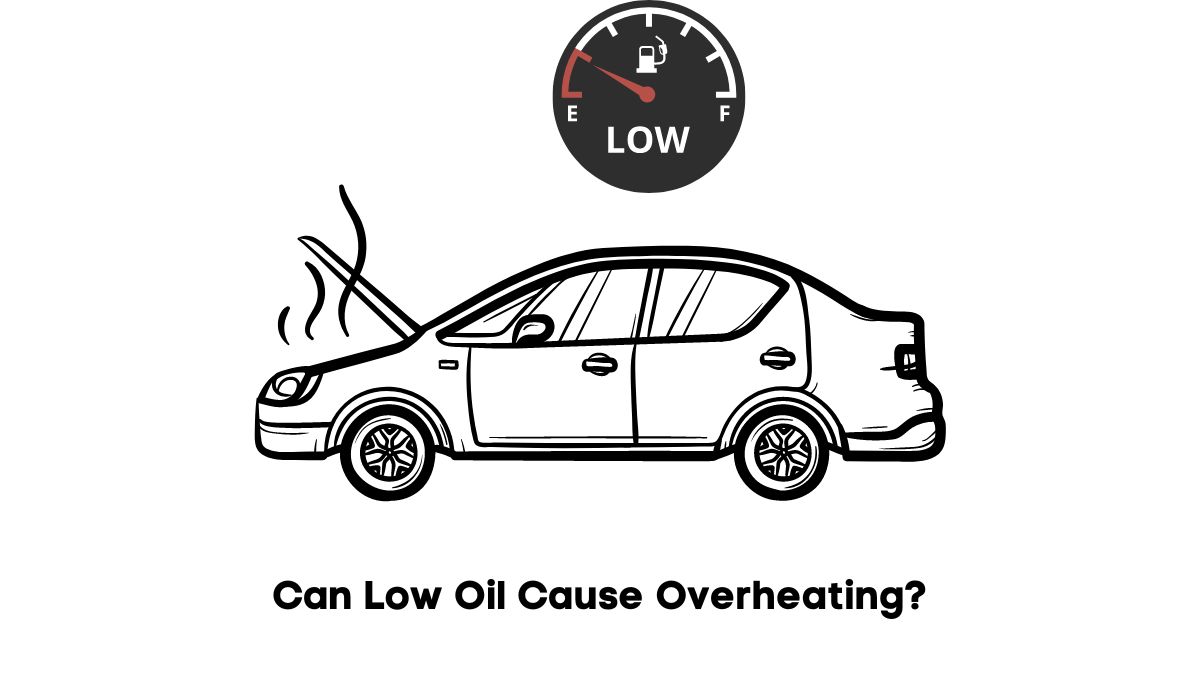Oil has additives that fight corrosion, oxidation, wear, and tear. Therefore, low oil levels make engines less efficient, which, in turn, makes them more likely to overheat. The consequences could be devastating. They include the following:
- The gasket will blow.
- The cylinder heads will warp.
- The friction will knock various parts out of alignment.
- The pistons, camshafts, and rod bearings will fail.
- Expect a lot of knocking and thumping.
- The check engine and oil warning lights will illuminate.
- You may observe more corrosion than usual.
Addressing Overheating Caused By Low Oil

- Check the oil level using the dipstick. Make sure the car is parked on a level surface. Pull the dipstick out and wipe it with a clean cloth before pushing it back into the tube. If oil levels are low, add more oil.
- If the oil is old, change it. Oil breaks down as it ages. It becomes thinner and less effective as a lubricant. As such, you may observe the same symptoms mechanics associate with low oil levels, such as knocking and grinding.
- Smoke and the smell of burning oil typically point to a leak. But finding the leak is easier said than done. According to Capitol Toyota, repairing some leaks means dismantling the engine. They will search for degraded rings, seals, and valve guides.
- Damaged oil filters and crackled oil pans will contribute to a leak.
- If you recently replaced the filter, a poorly fitted oil filter will leak.
- If you notice symptoms of overheating after performing an oil change, confirm that you added the correct oil type. The wrong oil viscosity can lower the oil pressure. Many manufacturers sell summer and winter blends. A mechanic can recommend a brand that fits your location’s conditions.
- If the only sign of low oil levels and pressure is the information on the gauge, you need a mechanic to troubleshoot potential electrical problems. They can identify and repair faulty switches and sensors.
Fixing low oil levels will only prevent overheating if low oil levels are the problem. Unfortunately, engines can overheat for various reasons unconnected to the oil levels, including the following:
- Engines use coolant to maintain optimal temperatures. Therefore, a coolant leak will encourage overheating in an engine.
- While coolant doesn’t expire, it can degrade because of contaminants and impurities. This makes the coolant less effective. The engine will overheat until you replace the coolant.
- Coolant cannot circulate through the engine without a healthy water pump. If you have sufficient coolant but the engine keeps overheating, troubleshoot the water pump.
- Don’t be so quick to replace the water pump in a car with an engine that keeps overheating. Sometimes, the engine overheats because the belts are worn-out. Mechanics usually inspect and replace the belts when they service a car.
- The thermostat controls the flow of coolant in an engine. As such, a defective thermostat can prevent the coolant from flowing.
- Does the clutch fan work? Does it squeal when you idle the engine and set the heater to full blast? You may require a new clutch fan.
Role Of Oil In Engine Cooling
Most drivers change a car’s oil every 5,000 – 7,000 miles. But they don’t know why because they don’t understand the role oil plays in an engine’s operations. This is what you should know:
1). Engine Efficiency
Internal combustion engines are incredibly inefficient. Think about it. They make kinetic energy by burning fuel in a controlled explosion. You can’t expect them to use every ounce of energy they generate in the combustion chamber.
According to the Office of Energy Efficiency and Renewable Energy, roughly 30 percent of an internal combustion engine’s energy becomes hot exhaust gases. Manufacturers continue to innovate new technologies to improve the engine’s efficiency.
However, overheating is still a significant concern. David Boettcher has noted that internal combustion engines operate at temperatures above 176 degrees F. You can break a car’s engine by allowing temperatures to exceed the recommended range. This is why coolant systems are so important.
They use a blend of water and antifreeze to remove and dissipate heat, allowing the engine to maintain optimal temperatures.
2). Oil Cooling
Oil cannot cool a hot engine, not on its own. However, it can provide supplementary cooling services. This is because oil flows throughout the engine. It touches some of the hottest components and sections of the car.
From what Motor Week has seen, the oil will carry away some of the heat it encounters as it circulates, cooling after returning to the oil tank and repeating the process as it continues its journey through the engine.
Some vehicles have oil coolers. Car Throttle has published pictures of these components. The heat exchangers consider the fact that oil gains significant amounts of heat as it runs through the engine block, particularly in situations that involve vigorous driving.
To prevent the oil from attaining an unusable viscosity, the oil cooler draws the heat away by guiding the oil through a series of tubes boasting heat-releasing fins. The oil that leaves the cooler has a lower temperature than the oil that enters.
It can circulate through the engine block once again, collecting more heat as it goes. Oil cooling systems of this nature are common in performance vehicles. You don’t need them in ordinary cars. Oil in a regular vehicle can cool naturally in the sump.
3). Lubrication
Papers like this one from Xiaoxhun Chen, Muhammad Ammar, Rashid Abro, and Khanji Harijan routinely highlight the role oil plays as a lubricant. But many drivers don’t realize that lubrication prevents overheating.
Oil creates a thin film that prevents metallic components from touching one another when they move. The International Conference of Applied Sciences uses the term ‘Greasiness’ to describe oil’s penchant for attaching to metal surfaces to prevent direct contact between an engine’s moving parts.
Without oil, the heat from the friction would destroy the engine. The engine is more vulnerable than any other section of the car because it has too many moving parts. It can’t survive without oil.
4). Viscosity
The viscosity is tricky because it influences engine oil’s ability to perform its functions. You need a balance in density. A low viscosity reduces friction and fuel consumption. High viscosity reduces oil consumption. It also allows the oil to act as an effective sealant.
The viscosity will change with the temperature. For instance, high temperatures can decrease the viscosity to a point where the oil fails to lubricate the engine’s moving parts because it can’t cling to metal surfaces.
On the other hand, you don’t want the viscosity to decrease dramatically because the oil won’t flow. The Asian Journal of Applied Sciences has noticed that oil’s viscosity tends to match the weather. For instance, high-viscosity oil in cold regions is a bad idea because it delays lubrication.
Effects of Low Oil On Engine Cooling
Now that you know how oil influences an engine’s operations, you can probably understand the impact low oil levels can have on an engine’s temperature:
- Your first concern is the lubrication. Low oil levels translate into poor lubrication. Poor lubrication will increase friction as the metallic components rub directly against one another. As a result, the heat will increase.
- The oil captures and carries heat away as it flows through the engine. An oil cooler will increase engine oil’s cooling capabilities. A reduction in oil levels will lead to a reduction in the volume of heat the oil removes from the engine.
- On its own, this is not enough to cause overheating. The coolant can compensate for this deficiency. However, the oil will also remove debris and contaminants from the passageways as it circulates. Without sufficient oil levels, the resulting clogging in the passageways can lead to overheating.

